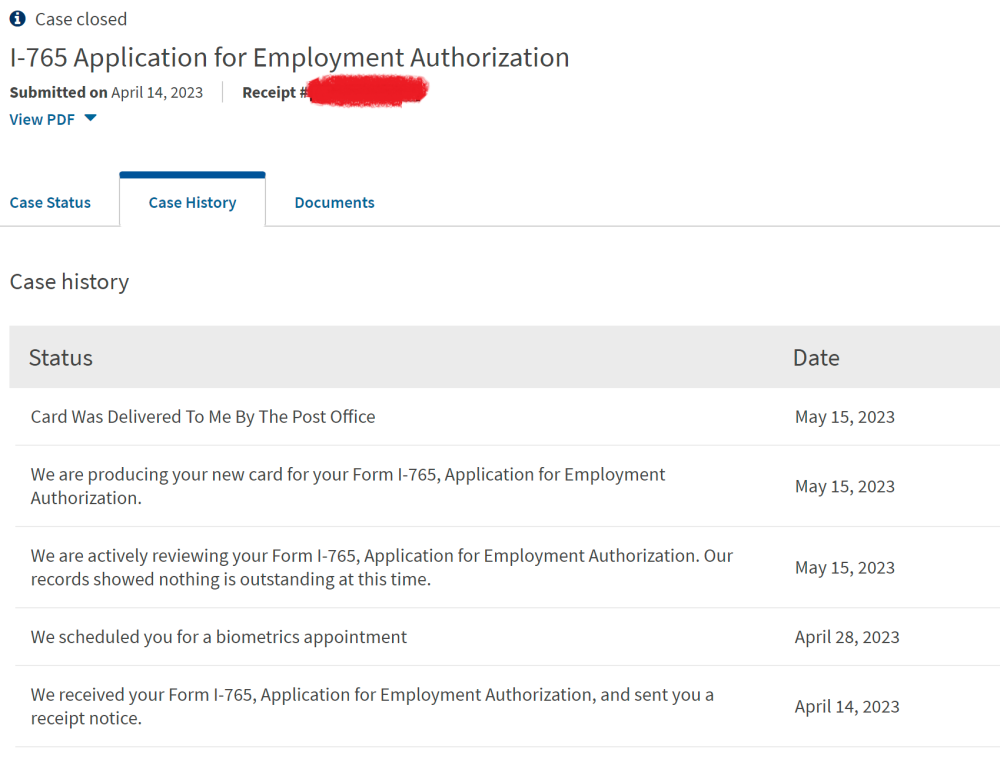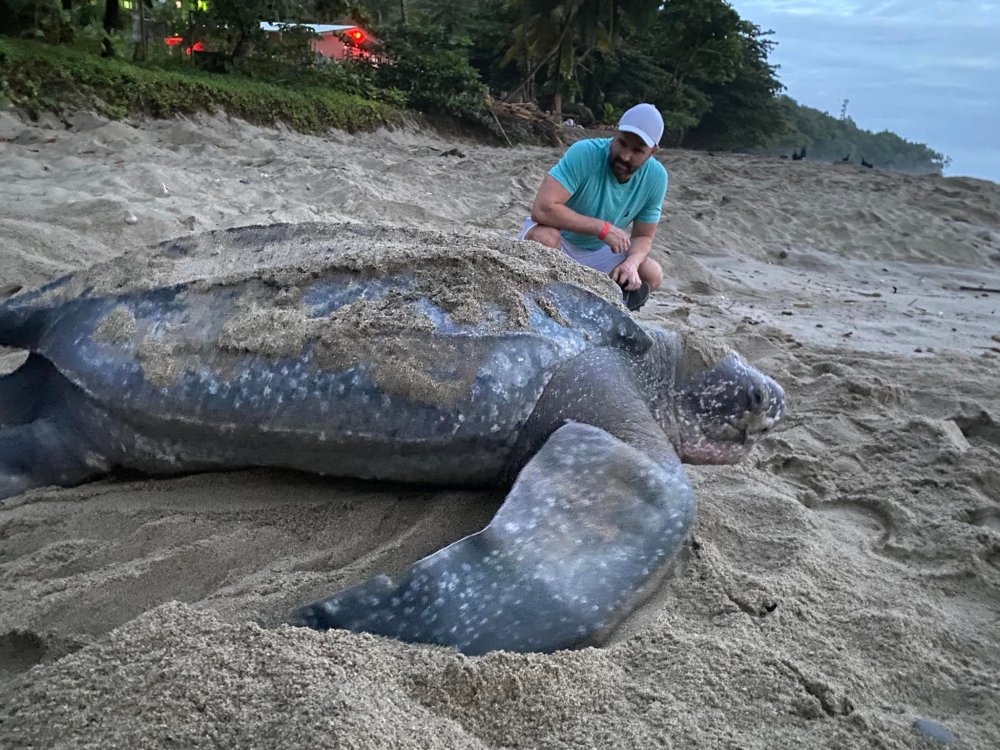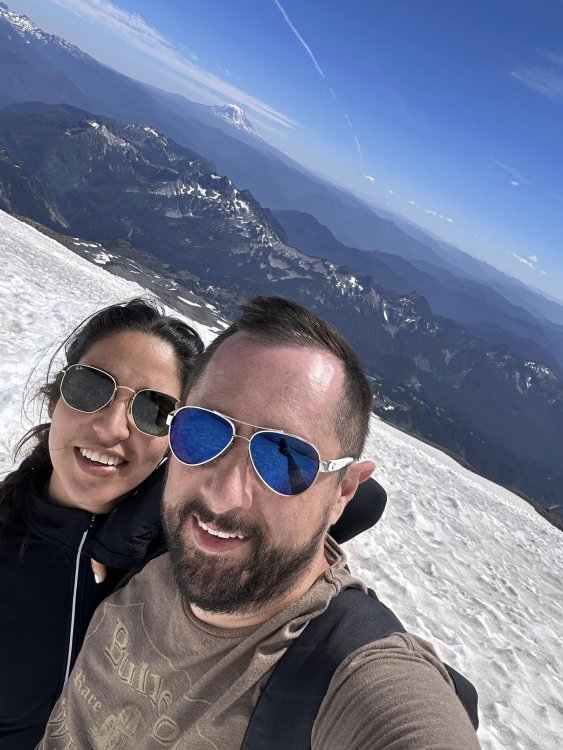-
Posts
194 -
Joined
-
Last visited
Content Type
Profiles
Forums
Partners
Immigration Wiki
Guides
Immigration Forms
Times
Gallery
Store
Blogs
Everything posted by wazzujoel
-
I am helping three Cubans with their AOS. They are adjusting from Cuban Humanitarian Parole via Cuban Adjustment Act and all three are related (mother, Father, son). I noticed on the i-485 application there is a checkmark that says "is this child/spouse applying with you?" This has caused me some confusion because I was planning on submitting three individual applications for them. Is there any reason why I should click yes or no in this box? Right now I am leaning towards making these three individual applications because I can't think of any real advantage to tying the applications together. thoughts?
-

Sending I-693 after I-485
wazzujoel replied to wazzujoel's topic in Adjustment of Status from Work, Student, & Tourist Visas
Thanks for the suggestion. That is the one thing I am worried about. I don't think she will have an interview, and she also didn't need to do biometrics because she did that for her i-765 EAD.... I was hoping to save time by avoiding an RFE, but I certainly don't want them getting confused by what I am sending. -
Well I only submitted the i485 which is now $1,440 after April 1st. $1,440 is what we sent and they accepted. ---- I did not pay for the other things you stated however looking at USCIS website it looks like i765 - $260 i130 - $675 So I would guess that the correct amount for you is : Total = $2,375 That said, you should try and calculate on your own because maybe you have certain conditions that change your amount. Plus these prices changed April 1st. Here is the fee calculator https://www.uscis.gov/feecalculator
-
I am making this post here because it seems like the best place for my question. My fiancée is from Cuba, and although we started down the K1 path, she arrived to the USA on Humanitarian Parole. She has been in the USA now for over a year and we applied for Adjustment of Status (I-485) under Cuban Adjustment Act of 1966. In my area there is a very limited number of USCIS civil servants, so we sent the initial I-485 packet without completing the Medical on 4/12/2024. Today we are finishing the I-693 medical and will have the sealed envelope today 5/13/2024. Our notice date for I-485 is 4/26/2024 and we do have an MSC receipt number for this Adjustment of Status. Question - Should I send in this Sealed medical now or should I wait until we receive an RFE? If I send it in now, then where do I send it, and do I send it with a letter of some sort explaining what it is?
-

i-485 Underlying Petition
wazzujoel replied to wazzujoel's topic in Adjustment of Status from Work, Student, & Tourist Visas
I tried editing the timeline but it wasn't obvious to me on how to change the timeline from K1 to something else (and if there was something else to even change it to). Edit - I just looked again and I see I can select a different category, however our category isn't an option. Additionally if I did that then all my K1 timeline goes away. I feel like it's best to leave it as is. -

i-485 Underlying Petition
wazzujoel replied to wazzujoel's topic in Adjustment of Status from Work, Student, & Tourist Visas
We started out with K1. Met my Cuban fiancée in 2017, had a 5 year friendship, that turned to a romance, and I filed i-129f on Oct 18 2021. On January 6th 2023 I submitted an application to support her via Biden's Humanitarian Parole program (i-134a) that was made eligible for Cubans on the day I filed. On February 10th 2023, USCIS approved our i-129f without an RFE. While waiting for USCIS to send our case to NVC, we were approved for i-134a Humanitarian Parole, and she arrived to the states on 4/7/2023. Once that happened, we abandoned the whole i-129f application because we no longer needed the marriage obligation for us to be together. We are still planning on getting married, however we are planning something a bit bigger and more to what we desire, versus trying to rush a 90 day wedding. She's also seeking i-485 PR based on Cuban Adjustment Act of 1966 which has a lot easier burden of proof than marriage based applications. So yeah, technically I am not K1 anymore. But this site doesn't really have spots for this form of immigration and we started out as K1 so some of my questions are related. -

i-485 Underlying Petition
wazzujoel replied to wazzujoel's topic in Adjustment of Status from Work, Student, & Tourist Visas
Thank you @Boiler and @Crazy Cat! Yes she is filing under CAA 1 day after the 1 year anniversary of arriving in the US. She arrived 4/7/2023, and it will be post marked 4/8/2024. -
Hopefully this is my last i-485 question and I hope I am asking in the right area.... I couldn't find any other area where this fit better. Cuban national arrived on Biden's Humanitarian Parole via a i-134a application. I don't really know if i-134a would count as a an Underlying petition. i-134a (online version of i-134) is a request from a USC to be a financial supporter of the Cuban for 2 years. That request contains lots of information about me, and just the name of the Cuban. Would this count as an Underlying petition? or do those coming on Humanitarian Parole not have an underlying petition?
-
In Part 3 it states the following : "Have you ever applied for an immigrant visa to obtain permanent resident status at a US Embassy" My partner is Cuban. I applied for i-129f for her in Oct 2021, USCIS accepted that application in Feb 2023, and sent the application to NVC. In Jan 2023 I filed an application for her with Cuban Humanitarian Parole, and that application was approved and we are living together in the US now. This i-129f application was just abandoned, and she never filled out any paperwork with NVC. She is now filing i-485 to get permanent residency via Cuban Adjustment Act. My question is - Do I answer "yes" or "no" to if she has ever applied for a immigrant visa to obtain permanent residency? I believe the K1 visa is a non-immigrant visa which she never even received, so I would answer "no" based on that. Additionally, since she never filled out any documentation with NVC, she also technically didn't apply for anything. I requested with USCIS a non-immigrant path for her, but that wasn't her request, it was mine. Note - I am not trying to hide the i-129f, I am really just trying to make sure I am answering the questions correctly.
-
You can get a K1 approval with one "in person" meeting at the airport for 1 minute before you reboard and fly home. The meeting doesn't have to be substantial to pass the USCIS i-129f "in person" meeting requirements. Additionally USCIS does not require you to prove you have a real relationship with the initial i-129F application packet. This is a mistake many people make in my opinion because they get so hung up on proving their relationship is real versus reading the directions carefully and providing everything they asked for exactly and nothing more. On personal note - You should really reconsider your path where you want to move forward with someone you have only met in real life 11 days total. I also have a relationship with a Cuban. I met her randomly on my first trip to Cuba in 2017 and I wasn't looking for love but a friendship formed from a spark I noticed. We remained online friends for 5+ years and during Covid a romance developed online. I traveled to see her again in Sept 2021 during the height of covid which at the time all flights from the Americas were canceled. I had to fly from NY to Spain, and then from Spain to Havana, and then had to be locked for 5 days in a "quarantine hotel". I then spent the next month with her. After that I traveled to see her for 1.5 weeks in Nov 2021, 2 weeks in January 2022, 2 weeks in March 2022, 1 weekend in may 2022, we both traveled to Trinidad and Tobago for two weeks in June 2022, and then I came back for a week in July 2022, and then two weeks in September 2022, and then a weekend in Oct 2022, 1.5 weeks in Nov 2022, and then two weeks in Jan 2023, and finally she arrived to the states on April 7th 2023 on i-134a. Why am I telling you all this? This is important - Even with all of this in person visit, it's a huge change going from "full time long distance romance" to "full time 24/7 in person living together". We talked often about how our relationship would change when we were finally living together full time and it did, it was as we thought it would be. In my situation the transition has been quite successful. We are still in love and we are living a good life together, however I'd be lying if I said there aren't difficult times where we need to work through relationships. A long distance foreign relationship is no different than any other relationship, the only difference is you aren't spending enough time together in person to really discover the potentially real deal breakers. I'd highly encourage you to find some way to see your partner more. Borrow money from friends or family if that's what you need to do.... but without spending substantial time together you are really sitting yourself up for failure and heartache.
-
I successfully brought my Cuban fiancée and her direct family (and one friend) to the USA on i-134a. I applied on January 6th 2023 and they were approved late March 2023. I have additionally applied for one of her first cousins in May, and that application remains untouched. I will tell you that it's a very frustrating process, and I feel that we were very lucky to have our applications worked on. You need to fill out the application correctly (read the directions closely and use common sense), but the process for selecting which applications will be processed is a literal luck situation. There are no timelines for processing, and it's possible your application will never be processed. Your application could be processed in 1 day after submission, or you could be waiting 1+ year of more. The i-129f fiance visa application was also frustrating, however at least that one has set timeframes which you can force them to process your case if you are outside of the established processing order. my thoughts for you would be to apply as soon as possible and cross your fingers. Also I would recommend submitting your application around 10:59-11am EST on a Monday and not the last week of that month and not a monday that is a holiday. This advice is me being a little superstitious but I have watched approvals in various groups, and I've noticed unsubstantiated patterns in approvals and I feel the timeslot I just listed gives you your best chance of approval.
-
As a side note - If you do end up going to Trinidad and Tobago you absolutely must get a rental car and drive out to the eastern coast and stay at the AcaJou hotel! Link below. They have super cute bungalows that are nestled between the beach and a rain forest. The food is locally grown, natural, and fantastic. The accommodations are are very romantic, and nice. And the most amazing part is the beach where this is, from like May-July these massive 2,000-2,500 lb leatherback turtles come onto this beach to instinctly dig a 4 foot hole, lay their eggs, and then head back into the ocean. They do this at night and to the early morning. The beach is protected but they sell passes where you can go with a guide and see all this first hand. Even baby turtles that were laid weeks ago might hatch and climb up through the sand. I helped a little guy get to the ocean, super amazing. And these animals are so massive! You really wont believe it. Probably about the size of a riding lawn mower, except maybe not that tall. www.acajoutrinidad.com Here was one of the turtles in the morning. If you go, get up early and head down to see them in the morning... At night they are guided and give you all the information you need to know. Early in the morning you can go by yourself and still see a few. Most of the magic happens at night. This turtle pictured below wasn't even one of the big ones.
-
Hello friends! Long time no see. And before you offer condolences, this isn't a sad story but a happy one! We received NOA2 on I-129F in February 2023, however before NVC contacted us she was approved for Humanitarian Parole (i-134a) and she has been in the states since April! Things are going great. She's enrolled full time in the local community college taking English classes and ESOL classes. Although she's fluent, she wanted to spend time with her grammar and pronunciation. She plans to get her dental education sent to the states, and work at becoming licensed here which requires decent English skills. Here is the question - Since USCIS/NVC doens't make it easy to cancel an application, we just decided to let it resolve itself of it's on volition. However I've heard through the grapevine that when we go to apply for premiant residency (I-485) under Cuban Adjustment Act (CAA) that an open i-129F case could cause a denial or delays. Is this true? And does anyone have a nice form letter to sign and send to USCIS and NVC to cancel this case? Lastly I never even contacted NVC, is it easy to find their mailing address or can any of this be quickly resolved with a phone call? Thank you Bonus pic : We claimed Mt Rainier up to Camp Meir last July. Not an easy hike, but we did it!
-
When I took this trip it was June 2022 and at the time I was able to buy a direct flights from Havana to Trinidad and Tobego on CaribbeanAir. I booked this flight in the states for her. At the time there was Covid restrictions which almost derailed the entire trip however we were able to work around it with appropriate bribes to get her a WHO approve covid vaccine. This isn't an issue anymore though. So give CaribbeanAir a call and try booking his RT flight for him. T&T might require him to have cash when he arrives because otherwise it looks like he might be trying to commit illegal immigration. When we went, I met her there and arrived before her and explained the situation. Immigration just rushed her through when she arrived because they knew she was with an american and only on a vacation.
-
I met my fiancée in 2017 when I randomly visited Cuba after changes President Obama made for US persons traveling to Cuba. I knew she was someone special right away from this chance meeting, however when I told her I was interested romantically she said, "Joel, I live in Cuba, you live in NY. It's ridiculous to think we could maintain a romance when we have spent so little time together. Please don't speak of this nonsense again, and accept that we will only ever be friends". So I accepted this even though I thought she was wrong, and over the next 4-5 years we had an online friendship only. We usually chatted once a month and liked each others social media, but nothing much more and I never believed it would be anything more than a friendship. In March 2021 during Covid, a spark happened and she realized that she had developed feelings for me. We started talking daily, and discussing how we could make this romance real. It took until September 2021 for me to finally get back to Cuba, and when I did I had to fly through Madrid Spain because travel to Cuba had been highly restricted by the Cuban Regime because of Covid. I spent September 2021 in Havana, and over the next 2 years I've traveled to Cuba 11 additional times; Additionally we both traveled to Trinidad & Tobago for a two week vacation. This was her first time leaving Cuba. I filed for i-129f and received NOA1 on October 18th 2021. On January 6th 2023 I applied i-134a Humanitarian Parole. On February 10th 2023 we had our i-129f application approved by USCIS (NOA2) without receiving an RFE. On 3/24/2023 our i-134a application was confirmed, and she received Travel Authorization later that same day. I tried literally everything to get USCIS to take action on my application, however getting movement out of USCIS is impossible. Feel free to ask me questions about the i-134a humanitarian parole processes, and I'd be happy to share more about my details. I've shared this before, however this is a short video I made last October that is a glimpse of our life. Finally after two years we are about to start our everyday life together 🙂






